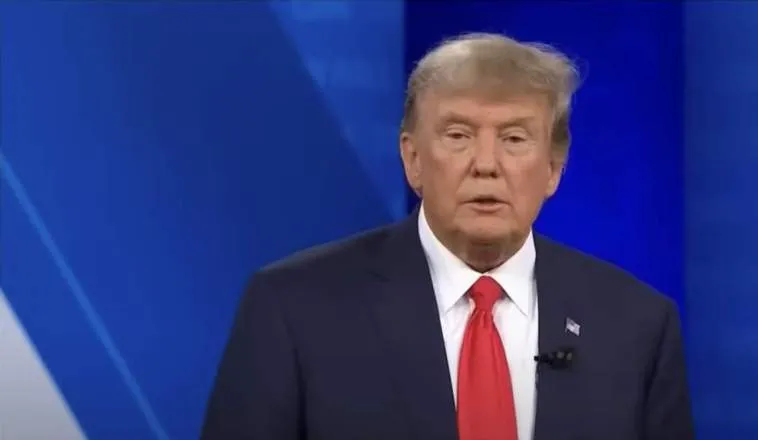(Washington Examiner) Former President Donald Trump‘s federal indictment amid other criminal investigations raises the possibility that the leading Republican for the 2024 presidential nomination could face time in prison.
Trump faces a second indictment this year, this time on federal charges regarding his handling of classified documents, but there stands no barrier to running for president as a convicted felon or even behind a prison cell, as Eugene V. Debs did in 1920.

Former President Trump leaves Trump Tower for Manhattan Criminal Court in New York on Tuesday, April 4, 2023. Trump will be booked and arraigned on charges arising from hush money payments during his 2016 campaign.
(AP Photo/Corey Sipkin)
All eyes are on the former president and how he will move forward after what House Speaker Kevin McCarthy (R-CA) called a “dark day” for the United States.
For legal purposes, the two key points are whether Trump is convicted and whether he wins the presidency.
Trump’s legal counsel will likely aim to delay the trial for as long as possible, though it’s almost certain that Trump will be tried criminally in the middle of his presidential bid. Trump would be able to make bail and won’t be jailed in the interim, and he can keep running for office regardless of the charges against him.
While Debs is far from the only person who sought the Oval Office while in prison, he is considered the most successful. In 1920, he became the Socialist Party nominee while serving a 10-year federal sentence for urging people to avoid the World War I draft.
Debs only earned 3% of the popular vote, not nearly enough to raise a serious consideration of the complex matters of what happens if an imprisoned candidate wins the general election.
If Trump were elected and took office before his trial reached a verdict, some legal scholars have suggested he could dismiss federal charges against himself because the Justice Department would be forced to answer to a sitting president.
“I mean, he could order it ended almost certainly,” Case Western University law school professor Jonathan Adler told the Washington Examiner.
Legal experts have speculated the trial could take up to a year and a half before it begins.
“Things move quickly in federal court under the Speedy Trial Act, but in a case of this magnitude, we can expect it to take about a year before it goes to trial,” Steve Toland, a criminal defense attorney who focuses on federal white-collar defense and investigations, told the Washington Examiner.
But Adler was not entirely convinced the criminal proceedings against Trump would extend until the November 2024 election.
“We usually expect criminal proceedings, especially federal criminal proceedings, to be somewhat slow, but I would not assume necessarily that any of these trials would extend the election,” Adler said.
Others have said actions like a self-pardon could be unconstitutional because it sidesteps the notion that nobody should be the judge in his or her own case. And the DOJ could deviate from its policy in “extraordinary circumstances” under the approval of the U.S. attorney general.
“This is contested … but I’m most convinced by the argument that the nature of a pardon as something that can be given — has to be bequeathed upon someone or given to somebody — is such that it can’t be given to oneself,” Adler said.
And some experts say a self-pardon is constitutional because the pardon power is very broadly worded in the Constitution, stating that presidents “shall have power to grant reprieves and pardons for offenses against the United States, except in cases of impeachment.”






